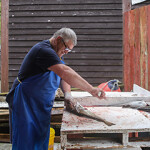Prairie AquaTech’s fermented soy protein feed tested on shrimp in Honduras

When shrimp growers across Central America need advice, they turn to Honduran shrimp farmer Napoleon Araujo.
Araujo has a hand in just about every step of the shrimp supply chain. He's on the board of directors of Laboratory Unifinca, the largest hatchery production facility in Central America, with a capacity of 400 million post-larvae per month – larvae for 12,000 hectares in Honduras and Nicaragua. His first company, Inversiones Espiritu Santo, has 350 hectares that produce about 2.1 million pounds of shrimp per year; the company buys another one million pounds from a different producer.
Araujo is the president of two additional companies: One owns a processing and packaging facility for the other companies’ whole shrimp and peeled shrimp – plus the products they buy from other producers – with a capacity of 40,000 pounds per day. Another sells and distributes equipment, larval feeds, and other aquaculture supplies and products to neighboring countries.
And now, Araujo, who has been in the industry for 22 years, is part of a trial testing Prairie AquaTech's fermented soy protein ME-PRO in shrimp feed. He has already conducted a feed trial at his hatchery; next, he will test the product's grow-out in earthen ponds.
ME-PRO's fermentation process uses microbes to consume the sugars and process proteins, improving the digestibility and quality of the protein, and resulting in a 70 percent as-fed protein content. Better digestibility allows the animals to incorporate phosphorous and nitrogen better – reducing the amount of phosphorous in discharge water, improving water quality, and lessening environmental pollution. ME-PRO also contains no genetically modified organisms.
"We believe this product will help us hold our water quality and increase our production," Araujo told SeafoodSource. "I have been working in different investigations into my facilities, testing different formulations ... We think that we have found products that can help us to improve our results."
Araujo sells shrimp to companies in Spain, Taiwan, France, the United States, Mexico, Costa Rica, and Guatemala. His companies started importing shrimp feed four years ago, and it re-sells it across Central America. The Honduran market for shrimp feed isn't significant, but the region as a whole has potential, Araujo said.
Honduras has 23,000 hectares of shrimp production, Araujo said, but the local industry is declining as a fast-growing global shrimp industry has driven down prices. Araujo predicts that improved technology will drive even further growth in the shrimp industry – and that the open-minded first adopters will win the race.
Ecuador stands out as a country where shrimp producers are testing and embracing new technologies. Araujo believes that's the reason Ecuador is now the world's leading shrimp exporter. In Honduras, shrimp growers are more conservative.
"We go more slowly, but I hope that we can improve our mentality and improve our systems fast. For that reason, I push people to use these technologies in my country, and now I'm very proud of the results," Araujo said. "The future will be more easy if you have your mind open to the changes."
Major changes are ahead, Araujo added.
"I think that the shrimp industry will have a metamorphosis like the chicken industry, and it will rapidly become an industry with small margins and big volumes," Araujo said. "People will continue increasing their production and prices will continue to go down."
The shrimp feed trial will help Prairie AquaTech gain data on how ME-PRO performs with shrimp, supplementing datasets the company already has for sea bass and other fish. Since shrimp have a faster life-cycle, the company will be able to collect data on performance in just a few months.
Speedy testing and nimble movement are vital in an industry that changes quickly, according to Araujo. Opportunities are abundant around the world as markets shift and farming conditions continue to change, from Central America to South America to Asia to Europe. In October, Prairie Aquatech announced that ME-PRO had met the documentation requirements needed to be sold in Europe.
As setbacks hit one region, another rises to meet the demand.
"There's a new disease that happens in a place that affects production and the U.S. is importing from that country and now we have to import from another country and now that country needs more feed," Prairie AquaTech Executive Vice President Sergio Nates told SeafoodSource. "It's very dynamic."
Nates believes that products that are environmentally friendly and sustainable will have a leg up on the competition. The millennial market relegates cooking to weekends, prefers attractive packaging, and diligently reads labels, so an ingredient like ME-PRO has to focus on being sustainable, traceable, and free of genetically modified organisms, Nates said.
"At the end of the day, our customer is not the feed operation. It's not even the guy who produces the shrimp. It's not even the guy at the grocery store,” Nates said. “It's us. It's us who walk into Whole Foods and buy the shrimp."
Photo courtesy of John Mollison/South Dakota Innovation Partners





Share